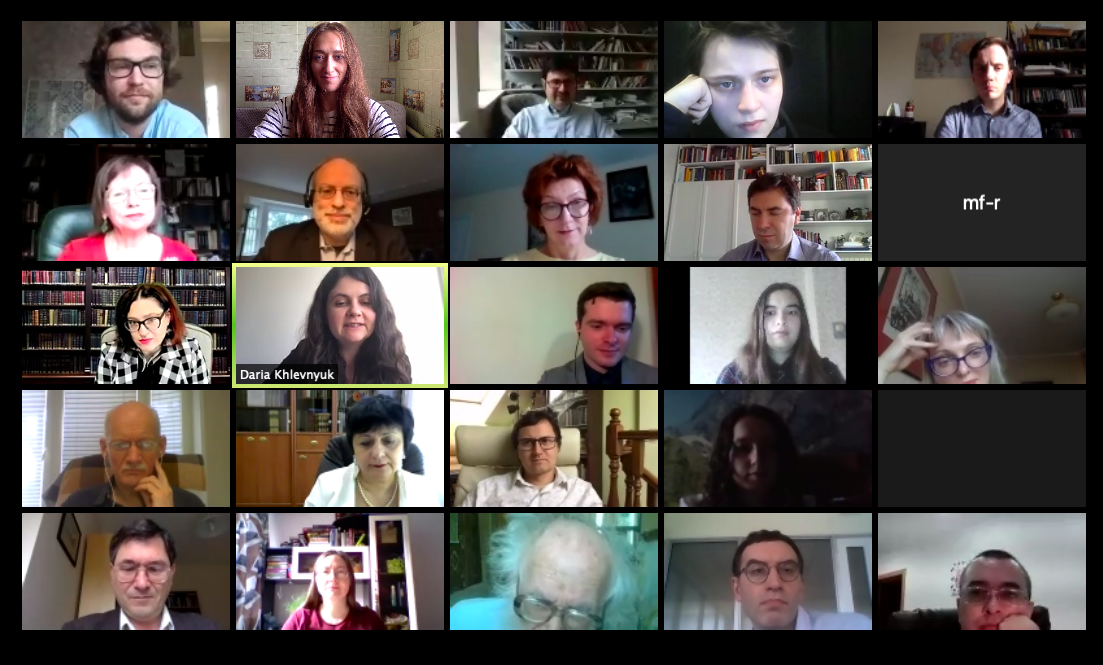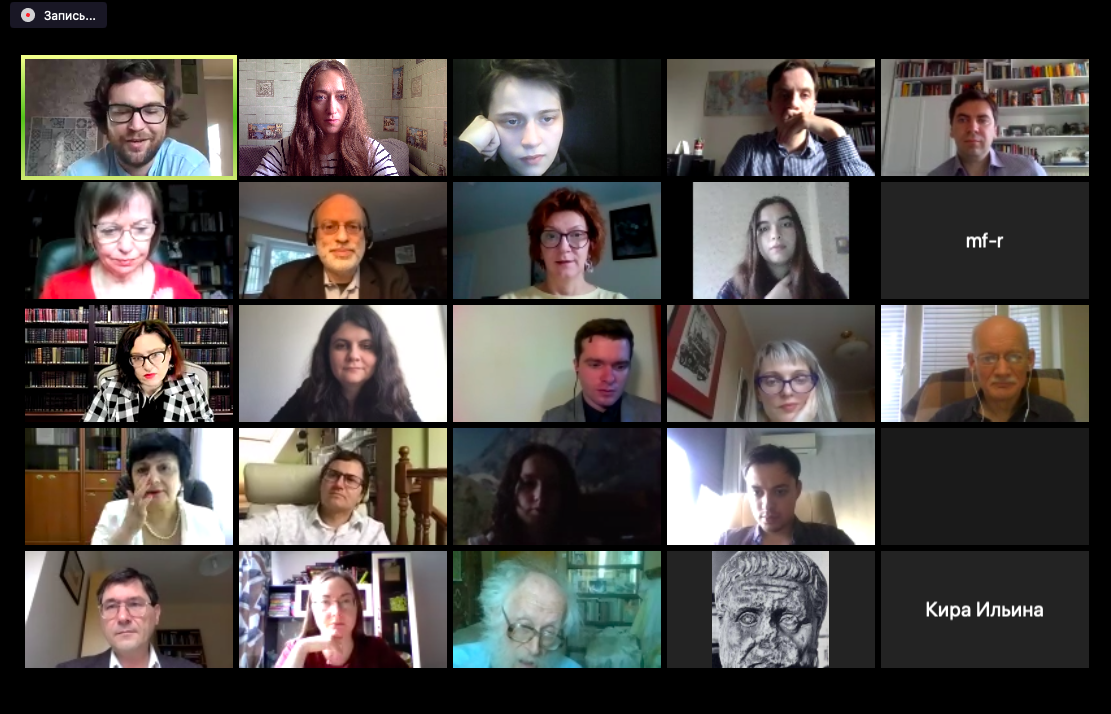Poletaev Readings Consider New Turns In and Away from Theory in the Humanities

The Poletaev Readings, dedicated to the memory of Andrey Poletaev, one of the founders of the Poletaev Institute for Theoretical and Historical Studies in the Humanities (Russian acronym — IGITI), is a major annual event of the Institute. The event was set to mark its 10th anniversary in 2020, but due to the pandemic, the anniversary forum has been postponed to 2021. In its place, the organizers have arranged the Poletaev Readings 9¾, which were held online. HSE News Service spoke with the event organizer and some of the participants.
Aleksei Pleshkov
Director, Poletayev Institute for Theoretical and Historical Studies in the Humanities
Our root idea was to organize a big international forum dedicated to the multiple futures of theories in the humanities and social sciences. However, as the pandemic grew, it became clear that it would be impossible to hold the conference in its traditional format, with the invitation to Moscow the leading experts in the fields and extensive discussions alive. Thus, we kept our idea and the anniversary 10th Readings for the next year, while the unusual numeration of this year's Readings – 9 and ¾ – underscored the unique nature of the moment. We invited the speakers and discussants to reflect on the key changes they have perceived in the theoretical discourse of their areas in recent years that are of central importance. With the focus on the actual present, not the future, our conference became one of the starting points of the project Frontiers of Knowledge in the Humanities, which we are undertaking jointly with HSE Faculty of Humanities this year.
Three round tables were devoted to different topics:
- The postcolonial turn in the history of knowledge
- The resistance to theory in the humanities (in particular, in literary studies)
- The transfer of cultural theory to the field of inequality studies

We tried to structure the conference in a way that minimizes the drawbacks of the online format while making use of its advantages: we made the abstracts available on the conference website in advance, so the discussion started even before the conference day (inter alia, in written form – which was more comfortable for some colleagues), the event features fundamental openness, discussions rather than monologues. Each round table was opened with conceptualizations by the keynote speakers, which undoubtedly sharpened and provoked further debates. By inviting discussants, whom we asked to comment on the points raised by our keynote speakers, we aimed to broaden and enhance the discussion. Interestingly, the online format is usually considered to exclude the problems connected with space and time (i.e., there is no need to fly over the ocean, and the conference's time starts with the click on the conference link). However, planning and conducting this online conference, with people joining from different parts of the world, it became apparent that the online format's synchronicity problematizes, rather than removes, the problem of spatiality and temporality of knowledge.
Given the significance of the topics proposed for discussion and the impressive, representative roster of participants (researchers from Princeton and Chicago, London and Paris, Moscow and St. Petersburg), it is not surprising that all our round tables aroused great interest among our colleagues. Now, we have an agreement with three leading academic journals interested in continuing our discussion in print (in this sense, our Readings starts three publication projects for us).
Michael D. Gordin
Rosengarten Professor of Modern and Contemporary History;
Acting Chair, Department of History; Director, Society of Fellows in the Liberal Arts, Princeton University;
Chief Research Fellow, Poletayev Institute for Theoretical and Historical Studies in the Humanities
I have been familiar with the work of scholars in Poletayev Institute for quite some time, and when I was invited three years ago to collaborate with them, I was excited to participate. So far, because of the pandemic, I have been unable to visit Moscow as much as I had intended, which has been disappointing. I have engaged in several seminars on topics such as science in Eastern Europe, Soviet computing, and debates over pseudoscience with colleagues and students at Poletayev Institute. I am currently part of a working group to explore the history of “algorithmic rationality” in the Soviet Union.
What’s New in the Humanities?
One of the topics we discussed during the Poletaev Readings this year was whether the innovations that have happened to the humanities in the 21st century have been in the area of social theory or in the area of research practice. While there have been innovations, humanities scholars are also still fruitfully developing ideas from social theory from the 1980s and 1990s.
A very significant change in the new century, however, and especially in the last decade, has been the profusion of online resources and tools: documents, webinars, seminars, etc. These have enabled us to work together even at a distance, and they have also exposed scholars to many more sources than they could easily access before. I believe the implications of the interaction of these new practices and social theory remain to be fully understood.
I believe the most prominent change that has happened in the humanities in the 21st century is an increasing integration of ‘postcolonial’ approaches to knowledge.
Originally a set of tools developed to deal with the political and evidentiary challenges of working in colonial contexts like 19th-century India, the major impact this area of theory has had on the history of science has been to focus on questioning our assumptions about what ‘normal’ science looks like. In my talk, I drew out some of the consequences this line of reasoning has had in my field’
Challenges of the Pandemic
On the one hand, much of what a historian does is sit and read documents, and I have been making progress on several research projects where I have already gathered material. On the other hand, so much of the real rewards of being a scholar are the in-person conversations while teaching seminars, traveling to new archives and libraries, meeting colleagues to collaboratively work on joint projects — and all of these have become harder during the pandemic. So far, I think many of us have been able to keep those two trends in balance, but much depends on how long the current situation lasts.
I believe we will have all learned a lot both about how much is possible digitally, and also how valuable in-person contact is for creating new research, which we may have taken for granted in the past.
Galin Tihanov
George Steiner Professor of Comparative Literature, Queen Mary University of London, Elected Member of Academia Europaea;
Chief Research Fellow, Poletayev Institute for Theoretical and Historical Studies in the Humanities
My collaboration with HSE University began with a conversation with my old friend Alexander Dmitriev, whom I have always valued for the breadth of his knowledge. I thus found myself at Poletayev Institute, a brilliant place that is rather unique, and very much so on an international scale of comparison. Professor Irina Savelieva has become a wise and generous interlocutor and friend.
I think that even in the globally difficult circumstances in which we all find ourselves today, Poletayev Institute is continuing to thrive: there is so much energy and positive innovation generated by Aleks Pleshkov and his team – and the PhD and MA students are always a great pleasure to work with. In short, being part of Poletayev Institute is a true intellectual privilege.
Resistance to Theory
I think the most important changes we have been living with since the start of the 21st century are the growing resistance to theory and the turn towards a regime of knowledge production we can call participatory rather than disembodied (these two changes are interconnected). The battles over theory, indeed the sweeping resistance to theory that we have been witnessing for several decades now, is fast becoming part of a larger landscape marked by a momentous redefinition of culture and the human.
At present, we have come to realise – the hard way – that even highly developed societies appear to be unable to protect their citizens from the vagaries of nature. Science is thus once again under scrutiny, along with our basic values:what does it mean to be productive, what is the consensus minimum of economic and social provision and how should it be defined, etc. In other words, the most important change, and this is a broad-brush generalisation to some extent, is the new-born scepticism towards universally binding rationality and one-size-fits-all decisions.
The regional and local move once more into the foreground at the expense of the universal; the situational and practice-led rivals and increasingly displaces the bindingly rational, abstract, and disembodied mastery of reality.
At the Readings, I talked about the resistance to theory that has been building up in the humanities of late. This has everything to do with the global transition to a new regime of knowledge production, away from the disembodied thinking the West has been privileging for several centuries, and much more towards what one terms participatory knowledge, in which the practical situatedness and self-interest of the participants play a very important role. This important role we no longer seek to conceal but are, instead, happy to emphasise and promote, foregrounding the legitimacy of this new mode of cognition that is pragmatic rather than disembodied and abstract.

Critical New Factors
We should also take into account here the huge presence of the new social media which have transformed our notion of truth and authority and have confronted us with new, experiential modes of enquiry that are terribly self-centred and thus have little time for norms and criteria distilled in a bindingly rational and abstract manner.
To this, finally, we have to add the enormous significance of migration and mobility – physical and virtual – that have brought home the message that the previously self-evidently valid Western cultural material (or pool of evidence, if you will) which would inform social and cultural theory as we knew them, is neither self-evident nor compellingly or universally valid. Hence this much more sceptical attitude towards theory than before”.
Reassessing the Education Model
Teaching online forces one even more than before to concentrate on the very essence of things, on understanding rather than memorising. But the pandemic has also compelled us to recognise that the Anglo-Saxon funding model of university education is at a breaking point: many young people will from now on begin to question the value of campus-based instruction, and we will see blended teaching assert itself on a more permanent basis. It is less expensive to deliver, and this corresponds to the challenging economic and financial environment many households will face in coming years.
The process I describe above – the gradual supplanting of the liberal arts model of education, in which not only is everything delivered face to face but there is also an expectation of some form of social bonding with your peers and professors, is only a surface manifestation of deeper changes.
The most important one, I think, is that the university, as we know it, will gradually start losing its monopoly over the certification of students’ skills and knowledge.
The new online environment will give rise to a more dispersed learning environment, and there will be more competition between providers. What may well emerge from this new situation is a form of certification by various bodies (businesses, corporations) that begin to hire external experts to validate the skills and knowledge of young people based on a portfolio of courses or modules they may have taken with different providers of knowledge and skills. This would fundamentally challenge our traditional notion of what a university is and what its role in society amounts to.
A Fundamental Change
Covid-19 will bequeath to us, when it eventually recedes into the background, a situation of heightened vulnerability of the Anthropocene belief in a human-centred, rational, and progressive West.
The pandemic will have emphasised and radicalised various types of inequality and will have plunged us into a world of increasingly secondary, virtual appropriations of reality. The larger implications of all this remain to be seen. One of the trepidations that fill the air is that underlying Western ideas could as a result find themselves in a state of precarity, from which only a very conditional recovery might be possible.
The paper abstracts presented at the Readings are available here
Michael Dan Gordin
Chief Research Fellow, Poletayev Institute for Theoretical and Historical Studies in the Humanities
Aleksei A. Pleshkov
Director, Poletayev Institute for Theoretical and Historical Studies in the Humanities
Galin Tihanov
Chief Research Fellow, Poletayev Institute for Theoretical and Historical Studies in the Humanities
See also:
Early-Career Researchers Discuss Cooperation between Russia and Arab States
HSE University has hosted a conference entitled ‘Russia—The Arab World: Digital Future and Youth Cooperation,’ organised by the Faculty of World Economy and International Affairs (WEIA). The meeting took place in the run-up to the first Russian–Arab summit, due to be held in Moscow on October 15, 2025.
‘The HSE Faculty of Humanities Affirms Its Status as a Leading Centre in Russia and Abroad’
On December 1, the HSE Faculty of Humanities celebrated its 10th anniversary. In honour of the occasion, HSE leaders, representatives of other universities, and members of the Russian Academy of Sciences (RAS) gathered at the university’s Cultural Centre to congratulate the faculty.
The ICEF-CInSt Conference as a Platform for International Research Networking
On November 24–25, 2023, the 12th ICEF-CInSt International Finance Conference took place in Moscow. Researchers from Russia, China, Hong Kong, Taiwan, the USA, Canada, Italy, and the United Kingdom contributed as speakers and discussants. The organisers and participants of the conference shared their impressions of the event with the HSE News Service.
‘Studying Is an Invaluable Opportunity to Learn from Experts and Explore Diverse Perspectives’
Mateo Rojas Samper, from Colombia, is a student of thePolitics. Economics. Philosophy master’s programme at the HSE University Faculty of Social Sciences. Matteo spoke to the HSE News Service about the importance of engaging in both theory and practice in his studies at HSE University, as well as his participation in the Model United Nations and the Russia–Latin America International Parliamentary Conference.
‘Our Experimental Economics Community Welcomes Everyone from Professors to Bachelor’s Students’
From September 19–27, 2023, the Third Pacific School Conference on Experimental Economics (PSEE) will take place in Vladivostok. The conference has been organised by the HSE UniversityInternational Laboratory for Experimental and Behavioural Economics as part of the Mirror Laboratories project with the Research Laboratory for Modelling Socio-Economic Processes at Far Eastern Federal University. The conference will be held in an in-person format, and foreign participants can take part online.
Digitization of Manuscripts: Months of Searching Can Turn into Hours and Even Minutes
HSE staff members are participating in the ‘Russian Cultural Heritage: Intellectual Analysis and Thematic Modeling of the Corpus of Handwritten Texts’ project. This is aimed at developing a methodology for the automated analysis of manuscripts, eliminating the need for manual processing. HSE News Service spoke to Ekaterina Boltunova, project manager, Professor, Head of the Laboratory 'Russia’s Regions in Historical Perspective' at HSE Faculty of Humanities.
Pivot to the East: A Comprehensive Study of the Cultural and Civilisational Centres of the Non-Western World is the Top Priority
China and the Chinese world, South Asia, Southeast Asia, the Arab countries, Iran, Turkey, Central Asia and Africa are gaining new significance in Russia’s foreign policy. However, we do not know enough about the Eastern countries. It is necessary to change the priorities in education, starting from grammar school. Prospects for the development of domestic Oriental studies in the context of the new stage in the development of the system of international relations were discussed at a round table at HSE University.
‘I Admire HSE Students’ Eagerness to Learn, to Discuss, to Broaden Their Perspectives’
Robert Romanowski was a ‘Digital Professor’ at HSE University in November 2021. In his interview for the HSE News Service, he talked about the specifics of online teaching, his course on Strategic Branding, and the skills that are essential for marketing professionals today.
Russia and Africa: Time to Expand Cooperation
There is major potential for economic and humanitarian cooperation between Russia and African countries. Particularly, Russian organisations and universities can help transfer competencies and knowledge in the fields of agriculture, energy, industrial production, environmental management, climate change, and public administration. Experts and representatives of African embassies in Russia discussed these issues at the round table ‘Russia-Africa Sharing Knowledge’ hosted by HSE University.
The Brain in Space: Investigating the Effects of Long Spaceflights on Space Travellers
As part of an international project conducted with the participation of Roscosmos and the European Space Agency, a team of researchers used differential tractography to analyse dMRI scans ofcosmonauts’ brains and found significant changes in brain connectivity, with some of the changes persisting after seven months back on Earth. The paper is published in Frontiers in Neural Circuits.


